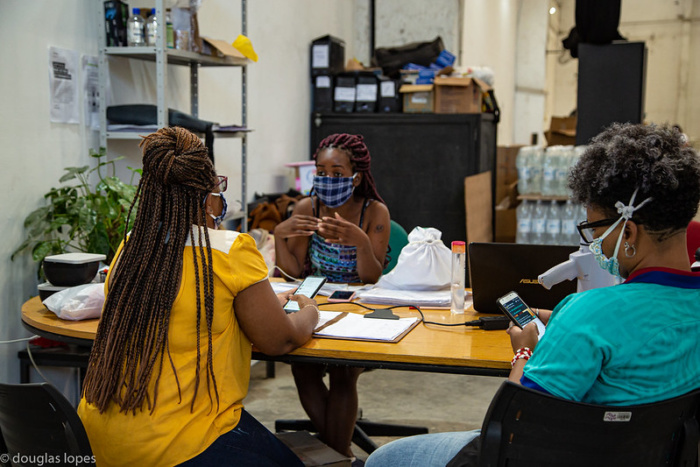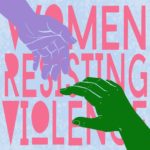‘We don’t change from outside in; we change from inside out. The seed I plant here in my home, I hope that it multiplies, among my neighbours, among my community. This is how we try to change. Change for the better. ’
A woman from the cooperative cooking project in the Women’s House of Maré in Brazil speaks of her personal journey of building social and gendered consciousness through joining the co-op. She refers to building ‘emotional-political communities’ in the process of recognizing and fighting gendered violence during crisis.
Recent research exploring how women dealt with and managed gendered violence in the favelas of Maré in Rio de Janeiro during the COVID-19 pandemic has shown that women’s collective emergency responses created further awakening among other women survivors of gendered violence. It shows that feminist organizing, for example in the Women’s House in Maré, creates two types of ’emotional-political’ bonds: reactive (immediately responding to the pandemic) and transformative (changing lives longer-term).

Maré, gendered violence, and the pandemic
Maré is one of the largest and most populous groups of favelas in Brazil, a territory affected by high levels of poverty, inequality, organised crime, and public insecurity. Pre-COVID research showed that 57 per cent of those surveyed suffered one or more forms of gender-based violence (34 per cent physical, 30 per cent sexual and 45 per cent psychological) with young Black women being most likely to experience it (69 per cent of black women compared to 55 per cent of mixed-race and 50 per cent of those identifying as white). Intimate partners committed 47 per cent of the violence with more than half occurring in the public sphere (53 per cent).
Although men are direct targets, women residents of Maré are direct victims of police incursions, crossfire and fighting, also being emotionally impacted by the terror that dominates life in the territory.
With the onset of COVID-19, socioeconomic, health, and infrastructural injustices have intensified resulting in families (often headed by women) facing hunger, despair, and more violence.
Yet Maré is also a centre of social struggle, where much of the resistance is led by women. Women typically openly protest in the face of death or aggression towards their families and are the ones who develop alternative household income strategies (45 per cent of women are sole heads of household – Krenzinger et al., 2018). They have also been historically active in fighting for the community’s improvements around housing tenure, basic services, and public security. Also, women have always developed tactics and autonomous practices to resist direct and indirect gendered violence.
What are ’emotional-political communities’?
Latin American feminist debates often address organized and collaborative practices to confront gendered violence against women, particularly in high-conflict urban areas. They emphasize how these practices can become more political and strategic over time, as women further develop awareness of their gendered and intersectional oppressions. Taking the lead from Colombian anthropologist, Myriam Jimeno, it has been shown that when personal testimonies are shared between women survivors of gendered violence in Latin America, emotional bonds are created, which can materialize into political action and ‘emotional communities’.
In adapting Jimeno’s original conceptualizations, we have developed the notion of ‘emotional-political communities’ that have been built in Maré during times of COVID-19 as part of resistance efforts to deal with both the gendered ramifications of the pandemic and gendered urban violence more broadly.
These emotional-political communities are reactive in responding to immediate crises, providing momentary solutions such as sustenance, shelter, basic information, and expert advice. They also become transformative over time, involving the provision of income-generating opportunities and organizing around reproductive rights and other social justice issues in the context of wider urban and structural violence, fostering societal change collectively.
How can they help women?
This woman from the cooperative cooking project refers to planting seeds. While for some, the seeds were planted in pre-pandemic times, others have become more engaged in their responses to COVID, showing that women-led initiatives can help other women deal with the severe and intersectional care and livelihood burdens of the pandemic, gradually leading to more structuring and transformative initiatives to foster autonomy and prevention of gendered violence in the longer term.
This topic is expanded on in the upcoming LAB book Women Resisting Violence: Experiences and Voices from Latin America. Learn more about the publication here.
The research outlined in this blog is funded by the British Academy and the Global Challenges Research Fund (HDV190030) directed by Cathy McIlwaine (King’s College London) in collaboration with People’s Palace Projects and Queen Mary University of London, Redes da Mare and the Federal University of Rio de Janeiro. For more information, see here.





